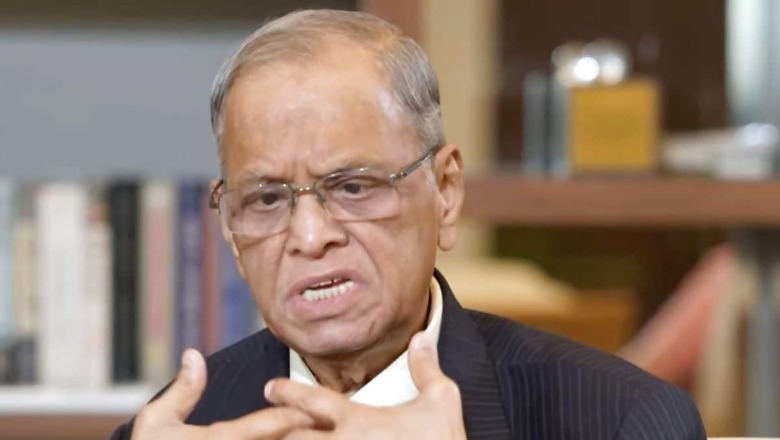
views
Infosys founder N R Narayana Murthy recently gifted 15 lakh shares to grandson Ekagrah Rohan Murty valued at around Rs 240 crore, according to a regulatory filing.
Murthy has gifted 15 lakh shares, or 0.04 per cent of his equity holding, to Rohan Narayana Murty son Master Ekagrah Rohan Murty –making him the youngest billionaire shareholder of Infosys.
The value of total gifted shares come to around Rs 240 crore as per company’s closing share price of Rs 1,602.3 apiece.
Ekagrah is the third grandchild of Narayana Murthy.
His first two grandchildren are daughters of Akshata Murty and UK Prime Minister Rishi Sunak.
Although the specifics of this share transfer remain undisclosed, similar to other forms of income, gifts can be taxable under specific conditions. However, exemptions from tax may apply to certain gift scenarios.
Similarly, in January 2024 Wipro founder Azim Premji transferred 1.02 crore equity shares of Wipro held by him to his two sons –Rishad Premji and Tariq Premji– as a gift.
What Rules Say On Gifting?
Under Section 56 of the Income Tax Act, this is the current taxation method for gifts in the recipient’s possession;
According to a report by Moneycontrol, cash gifts, immovable properties, and specified movable properties received without or with insufficient consideration from non-relatives are categorised as gifts.
The value of these gifts is accounted for as ‘income from other sources’ and taxed according to your relevant income tax bracket. In the case of a gift to a minor, the parent or legal guardian assumes responsibility for the tax obligation.
Money: Taxation is triggered only when you receive money gifts (in cash, via cheque, etc.) totaling more than Rs 50,000 in a year. Below this threshold, no tax is applicable.
Therefore, if you receive money gifts amounting to Rs 75,000 within a year, the entire sum—not just the excess over Rs 50,000 (Rs 25,000)—will be subject to taxation.
Movable property: If you receive certain specified movable properties without consideration (i.e., without making any reciprocal payment) during a year, and their total fair market value surpasses Rs 50,000, the entire amount becomes taxable.
In cases where you receive specified movable properties for inadequate consideration (i.e. when you make some reciprocal payment), taxation applies to the difference between the aggregate fair market value and the consideration paid, provided this differential amount exceeds Rs 50,000. For example, if you receive jewellery and paintings worth Rs 20 lakh in total during a year and pay Rs 12 lakh for them, Rs 8 lakh will be taxable.
It’s important to note that taxation is applicable solely to specified movable properties, including shares/securities, jewellery, archaeological collections, drawings, paintings, sculptures, any work of art, bullion, and virtual digital assets (such as cryptocurrencies).
Immovable property: When you acquire any immovable property (land and/or building) without consideration (no reciprocal payment made), and its stamp duty value (property value assessed by the government) exceeds Rs 50,000, the entire stamp duty value becomes taxable. For instance, if you receive a property with a stamp duty value of Rs 10 lakh as a gift, the entire amount will be subject to tax.
In cases where you acquire immovable property for inadequate consideration (some reciprocal payment made), taxation applies to the difference between the stamp duty value and the consideration paid, provided this difference exceeds Rs 50,000. For example, if you receive a property with a stamp duty value of Rs 25 lakh and make a payment of Rs 10 lakh, Rs 15 lakh will be taxed as a gift.
It’s worth noting that for money gifts and movable properties, the Rs 50,000 annual limit (for each) applies to the total value of gifts received during the year. However, for immovable property, the Rs 50,000 limit applies to each property transaction. Therefore, if you receive multiple properties as gifts in a year, and none of them surpasses the Rs 50,000 limit, no tax is applicable.
When gifts remain untaxed:
The Moneycontrol report added that in the scenarios outlined above, taxation is only applicable when gifts are received from non-relatives and surpass the Rs 50,000 limit (individually applicable for money gifts, movable properties, and immovable property).
According to the Income Tax Act, gifts received from relatives are exempt from taxation, regardless of their monetary value.
Who qualifies as a ‘relative’?
Let’s consider a hypothetical couple, H and W. H’s relatives include a) H’s spouse, b) H’s siblings, c) W’s siblings, d) H’s parents’ siblings, e) any direct ancestors or descendants of H or W, as well as the spouses of b), c), d), and e).
Direct ancestors encompass blood relatives such as parents, grandparents, and great-grandparents, while direct descendants include children, grandchildren, and so forth.
Gifts received in the context of marriage, through a will, or via inheritance are also exempt from taxation. It’s important to highlight that marriage is the sole occasion on which received gifts remain untaxed. Gifts obtained on any other occasion are liable to taxation.
Additionally, the exemption extends to instances where funds are received from specific sources such as funds, foundations, educational and medical institutions (as outlined in section 10(23C)), or from charitable trusts and institutions (as specified under sections 12A, 12AA, and 12AB).




















Comments
0 comment